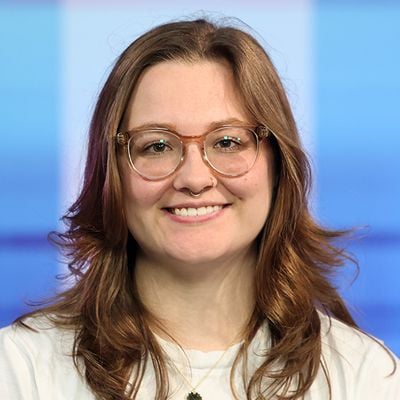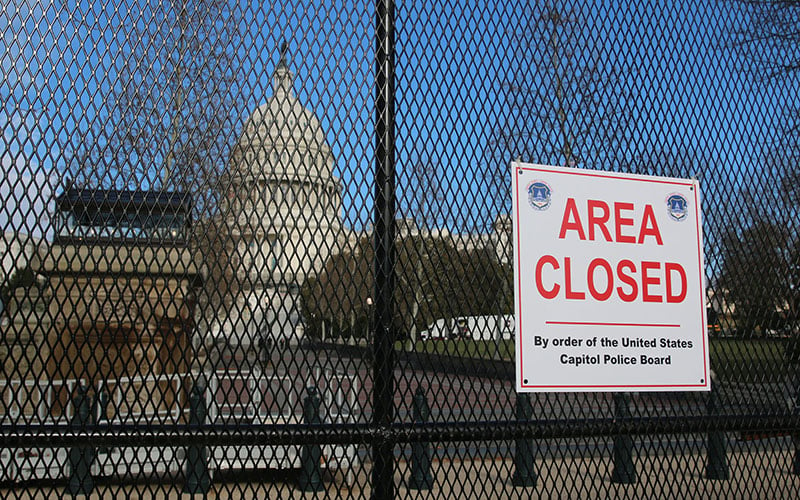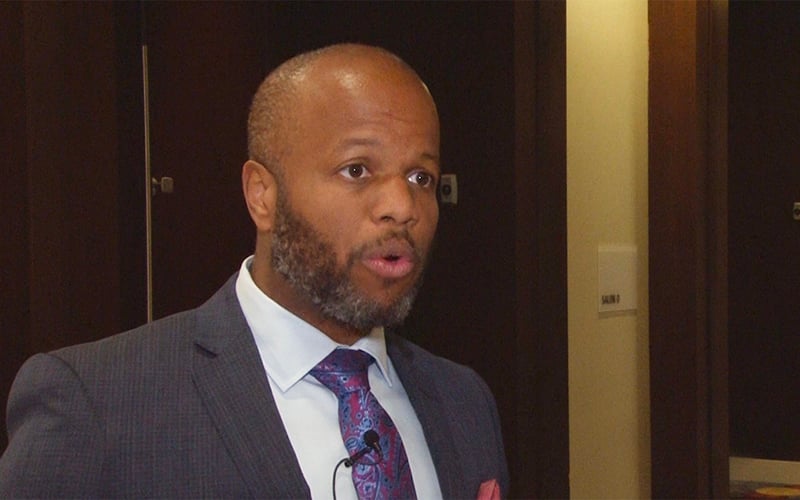
Tempe Mayor Corey Woods said his city was able to use $3.5 million of the $45.8 million it got under the American Rescue Plan to buy a motel that will be converted into housing for 40 homeless people. (Photo by Alexia Stanbridge/Cronkite News)
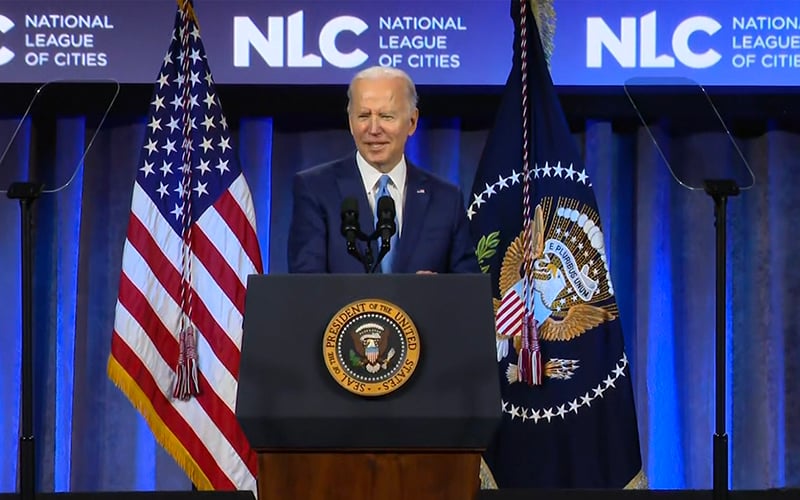
President Joe Biden touted what he called the successes of the American Rescue Plan, a $1.9 trillion COVID-19 relief measure that included $130 billion in direct aid to cities. (Photo courtesy the White House)
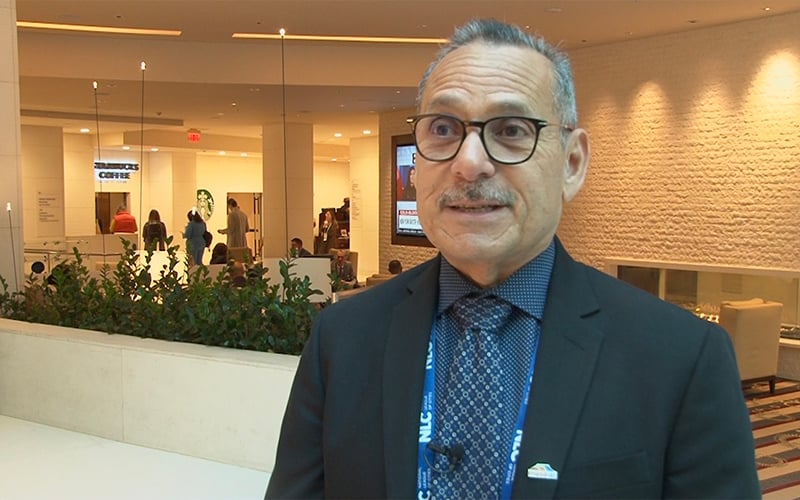
Mesa Councilmember David Luna said that even though attendees at the National League of Cities conference still wore masks, it was good to finally meet face-to-face with colleagues this year after two years of virtual meetings. (Photo by Alexia Stanbridge/Cronkite News)
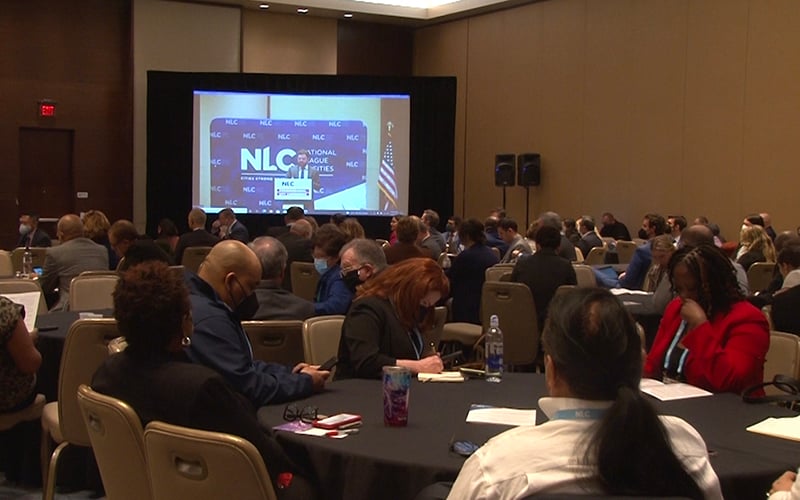
The National League of Cities conference in Washington this week drew about 2,000 local officials, including close to 100 from Arizona cities, for several days of meeting and lobbying. (Photo by Alexia Stanbridge/Cronkite News)
WASHINGTON – President Joe Biden came to the National League of Cities conference here this week to tout the success of the American Rescue Plan, a $1.9 trillion COVID-19 relief package approved last March.
It was not a tough sell.
Many were like Mesa Mayor John Giles who said the billions that went to local governments “has given us the resources needed to develop programs and initiatives to continue to address homelessness, fight food insecurity, bridge the digital divide and strengthen our small businesses as they rebound.”
Besides tax credits, rental assistance and expanded jobless benefits, the plan directed $130 billion to county and city governments, with 24 Arizona cities getting just over $1 billion, according to the Treasury Department. That ranged from $4.3 million for Douglas to $396.1 million for Phoenix.
“I urge you all to use the flexibility we built into the law to spend these funds wisely: to reduce violence in your communities,” Biden said during a nearly half-hour speech Monday to a cheering audience. “To address homelessness and affordable housing … to expand high-speed Internet … or to train people for good-paying jobs.”
Tempe Mayor Corey Woods said his city was able to use funds from the program to buy a Rodeway Inn that it converted into a shelter with the capacity to house 40 homeless people.
“Imagine if you’re unhoused and living on the street and how seriously challenging that time was,” Woods said at the conference Tuesday. “So the fact that we were able to purchase that motel was really big in terms of helping 40 people to get off the street and begin the process of turning their lives around and getting them the services they need.”
The Rodeway Inn project used $3.5 million of the $45.8 million in American Rescue Plan funds the city got. Tempe Councilmember Jennifer Adams said the city has not yet determined where the rest of the money will go.
Mesa City Councilmember David Luna said his city also plans to use some of the $105.5 million it received on efforts to combat homelessness in the city.
“We are going to be using some of those funds to provide relief in providing housing opportunities, as well as direct services to our homeless and providing some wraparound services, working with our nonprofits,” Luna said.
The plan included $350 billion for state and local governments, but Biden said it intentionally sent $130 billion “straight to local governments.”
“A big part of the reason we’re so successful is because the Rescue Plan went directly to you without having to pass ‘Go,’ without having to go to the statehouses,” said Biden, who credited local officials for best understanding the needs of their communities.
Adams praised the administration for the funding, but emphasized that more money would help cities as they work to bounce back from the COVID-19 pandemic.
“COVID hit us hard and we have a lot of residents that are in need, and you can never have too much money when you are a city government, because the needs always, always exceed what the money is,” she said.
Giles echoed Adams’ sentiments about the toll COVID took on cities.
“During the height of the pandemic, the City of Mesa became a food bank and many of our staff became skilled community service providers,” he said in a prepared statement. “We learned so much through those experiences.”
Luna, Adams, Giles and Woods were among almost 100 local Arizona leaders who attended the three-day conference, which hosted about 2,000 municipal leaders from across the country. Besides sessions on infrastructure, broadband connection, technology and more, attendees heard from Biden Cabinet members and were able to lobby their members of Congress.
“I plan on taking all of the information that I’m learning as a result of being here through the sessions or having conversations with colleagues and really taking pieces of that back to continue to help to improve the city of Tempe,” Woods said.
“I keep thinking that the future is going to be extremely bright under this president and all the work that he’s doing,” he said.
For many it was one of the first in-person conferences since the pandemic began in March 2020. Luna said that ability to meet with peers face-to-face in the nation’s capital, to network and share ideas with leaders from other cities, is invaluable.
“As politicians, we tend to want to hug and embrace each other,” Luna said. “This gives us the opportunity to do that, very limited, because we still have to wear our masks, but it was great to see each other’s faces, and to have that camaraderie that we haven’t been able to have for the last two years.”
